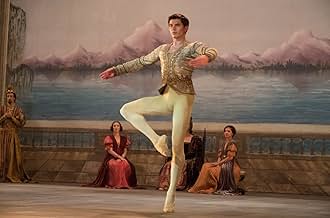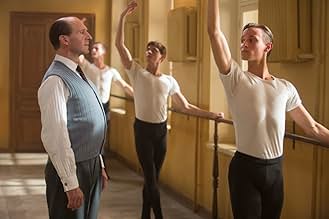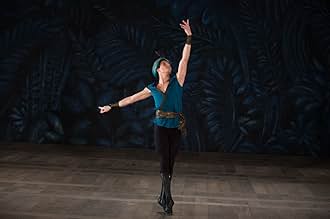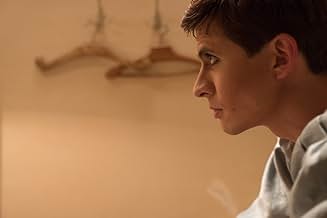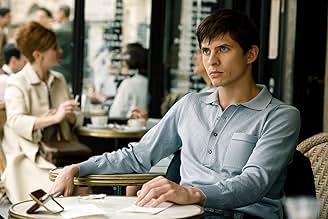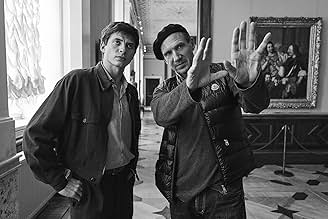IMDb-BEWERTUNG
6,6/10
7245
IHRE BEWERTUNG
Die Geschichte von Rudolf Nurejews Übertritt in den Westen.Die Geschichte von Rudolf Nurejews Übertritt in den Westen.Die Geschichte von Rudolf Nurejews Übertritt in den Westen.
- Regie
- Drehbuch
- Hauptbesetzung
- Auszeichnungen
- 1 Gewinn & 4 Nominierungen insgesamt
Empfohlene Bewertungen
A beautiful film. But not so convincing. Correct but easy to reduce it to the last part tension. Interesting portrait of the period, expression of admiration for Nureev art, seductive ballet scenes and the hard try to convince. But, in too many parts, the film remains only a sketch. The good points - hard effort of Oleg Ivanko to create his role and to convince the viewer, the passion of Ralph Fiennes to the project, the presence of Sergei Polunin and the performance of Adele Exarchopoulos. The result is, obvious, a beautiful one . But convince it ? In few points, with indulgence in other.
Have always absolutely loved ballet, such fantastic music and the dancing when well choreographed and danced really entrances me. Rudolf Nureyev in this field was one of the all-time greats, so charismatic, athletic and with leaps and jumps that would be, and are, the envy of many. Also respect Ralph Fiennes very highly as an actor, particularly as tortured characters, and he had shown a lot of confidence in his previous directorial efforts.
'The White Crow' is Fiennes' third film as director, while also featuring in a not large but important role, and stands up as a very interesting and well done film when seeing it with close family friends at the cimema two days ago. All three of us really enjoyed and admired 'The White Crow', being both film and ballet fans (my love of ballet came actually through them, when watching a production of 'Swan Lake' at six years old). We later wasted no time in talking about the things the film did well, while also discussing what could have been done better.
Did feel that the back and forth between the three different timelines could have been done with more clarity and didn't feel as rushed, especially in the early stages of the film. While the childhood scenes are well made and bleakly powerful, despite showing how deprived Nureyev's childhood was and how he came to be the way he was there could have been less of them.
It would have been an even better film too if there were not as many close ups and slow shots, the former of which got slightly self-indulgent and the latter at times nauseated, and also clearer motivations as to why characters behaved the way they did. Although Nureyev's life was a volatile one and he was not easy to work with, anyone who is not familiar with him will be shocked at how his behaviour at a few points during the film is so abrupt and seemingly over the top for reasons not really gone into detail (especially the restaurant scene) that it is a wonder that he still had friends or a job. Also, and this is more an observation than a flaw really, was there anyone else who was slightly distracted by how orange Fiennes looked?
On the other hand, on the most part, 'The White Crow' looks great. The period detail in all three time periods, particularly when in Paris, is handsome and evocative and a vast majority of the film is beautifully filmed. Especially loved the intimacy of it during the dancing, whether it was when the dancers were rehearsing or were performing, and despite being initially put off by the queesiness of it during the scenes involving the defection and the lead up to it that added to the intense claustrophobia and suspense of that portion and fitted perfectly with Nureyev's state of mind. As to be expected the music is wonderful and performed musically with a lot of energy and nuance.
Similarly the dancing leaves one in awe, it is hard not to be envious of the athleticism and grace of it and of Nureyev's technique or not to admire Nureyev's dilligence. The script packs in a lot, maybe too much at times, and is thought-probing and is paced fluidly. Found the mix of English, Russian and French an interesting choice and it added to the authenticity and it does flow naturally, with the subtitles comprehension shouldn't be a problem. The story is not perfect but it to me was never dull and doesn't downplay what it was about Nureyev that attracted so many, the story highlight being easily the defection climax, the intense suspense of which made me bite my nails. Nureyev is still interesting. Did hear on a side note after the screening two ladies behind me whisper "why no Margot Fonteyn?", the answer being that the film covered what came before and during Nureyev's defection, she came later.
Fiennes directs with confidence and keen eye for detail, and the acting is as committed as the dancing. A dancer in real life, Oleg Ivenko's film debut is a wholly credible one and often excellent, he captures Nureyev's athleticism perfectly and while it is hard to match Nureyev's unique charisma Ivenko does very well there too. The supporting performances are equally fine, with the most notable being a quietly sympathetic Fiennes bravely speaking in Russian, a beautiful language and a difficult one and Fiennes masters it. Just to say, do think that the criticism 'The White Crow' has garnered on here is just strange and over-the-top, actually didn't find anything to be offended by here.
Overall, a good well done film. 7/10
'The White Crow' is Fiennes' third film as director, while also featuring in a not large but important role, and stands up as a very interesting and well done film when seeing it with close family friends at the cimema two days ago. All three of us really enjoyed and admired 'The White Crow', being both film and ballet fans (my love of ballet came actually through them, when watching a production of 'Swan Lake' at six years old). We later wasted no time in talking about the things the film did well, while also discussing what could have been done better.
Did feel that the back and forth between the three different timelines could have been done with more clarity and didn't feel as rushed, especially in the early stages of the film. While the childhood scenes are well made and bleakly powerful, despite showing how deprived Nureyev's childhood was and how he came to be the way he was there could have been less of them.
It would have been an even better film too if there were not as many close ups and slow shots, the former of which got slightly self-indulgent and the latter at times nauseated, and also clearer motivations as to why characters behaved the way they did. Although Nureyev's life was a volatile one and he was not easy to work with, anyone who is not familiar with him will be shocked at how his behaviour at a few points during the film is so abrupt and seemingly over the top for reasons not really gone into detail (especially the restaurant scene) that it is a wonder that he still had friends or a job. Also, and this is more an observation than a flaw really, was there anyone else who was slightly distracted by how orange Fiennes looked?
On the other hand, on the most part, 'The White Crow' looks great. The period detail in all three time periods, particularly when in Paris, is handsome and evocative and a vast majority of the film is beautifully filmed. Especially loved the intimacy of it during the dancing, whether it was when the dancers were rehearsing or were performing, and despite being initially put off by the queesiness of it during the scenes involving the defection and the lead up to it that added to the intense claustrophobia and suspense of that portion and fitted perfectly with Nureyev's state of mind. As to be expected the music is wonderful and performed musically with a lot of energy and nuance.
Similarly the dancing leaves one in awe, it is hard not to be envious of the athleticism and grace of it and of Nureyev's technique or not to admire Nureyev's dilligence. The script packs in a lot, maybe too much at times, and is thought-probing and is paced fluidly. Found the mix of English, Russian and French an interesting choice and it added to the authenticity and it does flow naturally, with the subtitles comprehension shouldn't be a problem. The story is not perfect but it to me was never dull and doesn't downplay what it was about Nureyev that attracted so many, the story highlight being easily the defection climax, the intense suspense of which made me bite my nails. Nureyev is still interesting. Did hear on a side note after the screening two ladies behind me whisper "why no Margot Fonteyn?", the answer being that the film covered what came before and during Nureyev's defection, she came later.
Fiennes directs with confidence and keen eye for detail, and the acting is as committed as the dancing. A dancer in real life, Oleg Ivenko's film debut is a wholly credible one and often excellent, he captures Nureyev's athleticism perfectly and while it is hard to match Nureyev's unique charisma Ivenko does very well there too. The supporting performances are equally fine, with the most notable being a quietly sympathetic Fiennes bravely speaking in Russian, a beautiful language and a difficult one and Fiennes masters it. Just to say, do think that the criticism 'The White Crow' has garnered on here is just strange and over-the-top, actually didn't find anything to be offended by here.
Overall, a good well done film. 7/10
The film's title derives from the Russian phrase "belaya vorona", or "white crow", meaning an outsider or nonconformist, a person who stands out from his or her contemporaries in the way that a white crow would stand out from its black fellows. The "white crow" of this film is the Russian ballet dancer Rudolf Nureyev, a man who had difficulty conforming to the official Soviet system, either in his artistic life or in his personal life. (He was gay at a time when this was neither lawful nor acceptable in Soviet society).
Nureyev shocked the world of ballet when he defected to the West at Le Bourget airport, Paris, in 1961, and the film is built around this incident. His decision to defect was, apparently, a spontaneous one, taken when the Communist authorities, irritated by the fact that he had spent much of his time in Paris in the company of Western intellectuals and concerned by rumours that he had been seen in a gay bar, decided to send him back to Russia rather than allowing him to travel with the Kirov ballet to London, the next leg of their tour. Scenes of Nureyev's stay in Paris are intercut with flashbacks to his poverty-stricken wartime childhood in the provincial city of Ufa and to his time as a ballet student in Leningrad, as St Petersburg was then known.
The film was directed by the well-known British actor Ralph Fiennes, clearly a ballet enthusiast. Fiennes also takes an acting role as Alexander Pushkin- not, of course, the classic Russian author but Nureyev's tutor at the Kirov Ballet. This was, I felt, one of two outstanding performances in the film. Pushkin emerges not only as a visionary who spotted Nureyev's talent when many did not but also as a sympathetic father-figure who provided the young dancer with a kindness and understanding that was otherwise lacking in the rigid, inflexible Soviet system. The other great performance, of course, comes from the young Oleg Ivenko as the conflicted Nureyev himself. On the one hand he is held by a love of his Russian homeland, the land which contains all he knows and all that he has held dear- his family, his friends and his mentor Pushkin. On the other hand, he is drawn towards the West, not only because of the greater intellectual freedom which it offers but also because of a feeling that it is only there that he can fully realise himself as a dancer.
I must admit that I am not a great balletomane myself; I have been to the ballet on only a handful of occasions in my life, and never saw Nureyev dance except on television. Yet there are some films which have been good enough able to hold my attention even though they are centred upon activities in which I would normally take little interest. Like most Britons, I know little about baseball, yet I was enthralled by "Eight Men Out" and "Field of Dreams". I probably know even less about wrestling, but that did not prevent me from admiring the more recent "Foxcatcher". "White Crow" comes into the same category. Those who love ballet will doubtless be enthralled by it. Even those of us who do not will be able to see enough in this movie to understand the enthusiasm of those who do. And both groups will join together in their appreciation of the human drama which lies at the heart of Rudolf Nureyev's story. 8/10
Nureyev shocked the world of ballet when he defected to the West at Le Bourget airport, Paris, in 1961, and the film is built around this incident. His decision to defect was, apparently, a spontaneous one, taken when the Communist authorities, irritated by the fact that he had spent much of his time in Paris in the company of Western intellectuals and concerned by rumours that he had been seen in a gay bar, decided to send him back to Russia rather than allowing him to travel with the Kirov ballet to London, the next leg of their tour. Scenes of Nureyev's stay in Paris are intercut with flashbacks to his poverty-stricken wartime childhood in the provincial city of Ufa and to his time as a ballet student in Leningrad, as St Petersburg was then known.
The film was directed by the well-known British actor Ralph Fiennes, clearly a ballet enthusiast. Fiennes also takes an acting role as Alexander Pushkin- not, of course, the classic Russian author but Nureyev's tutor at the Kirov Ballet. This was, I felt, one of two outstanding performances in the film. Pushkin emerges not only as a visionary who spotted Nureyev's talent when many did not but also as a sympathetic father-figure who provided the young dancer with a kindness and understanding that was otherwise lacking in the rigid, inflexible Soviet system. The other great performance, of course, comes from the young Oleg Ivenko as the conflicted Nureyev himself. On the one hand he is held by a love of his Russian homeland, the land which contains all he knows and all that he has held dear- his family, his friends and his mentor Pushkin. On the other hand, he is drawn towards the West, not only because of the greater intellectual freedom which it offers but also because of a feeling that it is only there that he can fully realise himself as a dancer.
I must admit that I am not a great balletomane myself; I have been to the ballet on only a handful of occasions in my life, and never saw Nureyev dance except on television. Yet there are some films which have been good enough able to hold my attention even though they are centred upon activities in which I would normally take little interest. Like most Britons, I know little about baseball, yet I was enthralled by "Eight Men Out" and "Field of Dreams". I probably know even less about wrestling, but that did not prevent me from admiring the more recent "Foxcatcher". "White Crow" comes into the same category. Those who love ballet will doubtless be enthralled by it. Even those of us who do not will be able to see enough in this movie to understand the enthusiasm of those who do. And both groups will join together in their appreciation of the human drama which lies at the heart of Rudolf Nureyev's story. 8/10
First-time actor Oleg Ivenko gives a strong performance here in the lead role of renowned ballet dancer Rudolf Nureyev. The biopic also has a most solid supporting cast and is directed by the fine actor Ralph Fiennes (who also has a supporting role in the film), and is written by the most talented David Hare, based on the book by Julie Kavanagh.
The biopic covers the early years of Nureyev from his most difficult early life in the Soviet Union, his incredible innate talent for ballet dancing, his complicated and flamboyant personality, love of the arts, and a most fervent desire for freedom.
I felt the heart of the movie was the tension filled final 20 minutes or so of Nureyev's defection to the West at a Paris airport, in 1961.He would be the first Soviet notable to do so during the Cold War.
All in all, although this biopic is deliberately paced and a little too long at over 2 hours in length I felt it was a solid effort all around. To note, Rudolph Nureyev would pass away in 1993 from AIDS, at the age of 54.
The biopic covers the early years of Nureyev from his most difficult early life in the Soviet Union, his incredible innate talent for ballet dancing, his complicated and flamboyant personality, love of the arts, and a most fervent desire for freedom.
I felt the heart of the movie was the tension filled final 20 minutes or so of Nureyev's defection to the West at a Paris airport, in 1961.He would be the first Soviet notable to do so during the Cold War.
All in all, although this biopic is deliberately paced and a little too long at over 2 hours in length I felt it was a solid effort all around. To note, Rudolph Nureyev would pass away in 1993 from AIDS, at the age of 54.
My wife and I watched this at home on DVD from our public library.
While the focus of this movie is the 1961 defection of ballet dancer Nureyev you can't really tell that part of his life without understanding his beginnings, from being born on a train in 1938 to studying under the demanding Soviet system. Most of that takes up the first half of the movie.
I remember Nureyev well, he was such an inventive dancer and became popular world-wide in the 1960s and 1970s but I never knew his story. When the company of dancers would tour outside the USSR they were not supposed to exchange ideas or even talk to people from other countries but Nureyev never really followed the rules. When it looked like going back home might be bad for him, in France he defected, asking for political asylum. The scenes that retell and dramatize the incident are some of the best in this movie.
For the role Oleg Ivenko, a Ukranian who really is a ballet dancer in Russia and a first-time actor, plays Rudolf Nureyev and he plays him very well.
A really well made movie and a well told story, we enjoyed it.
While the focus of this movie is the 1961 defection of ballet dancer Nureyev you can't really tell that part of his life without understanding his beginnings, from being born on a train in 1938 to studying under the demanding Soviet system. Most of that takes up the first half of the movie.
I remember Nureyev well, he was such an inventive dancer and became popular world-wide in the 1960s and 1970s but I never knew his story. When the company of dancers would tour outside the USSR they were not supposed to exchange ideas or even talk to people from other countries but Nureyev never really followed the rules. When it looked like going back home might be bad for him, in France he defected, asking for political asylum. The scenes that retell and dramatize the incident are some of the best in this movie.
For the role Oleg Ivenko, a Ukranian who really is a ballet dancer in Russia and a first-time actor, plays Rudolf Nureyev and he plays him very well.
A really well made movie and a well told story, we enjoyed it.
Wusstest du schon
- WissenswertesHayden Christensen, who trained extensively in ballet as a child, was first choice to star; however a persistent ankle injury prevented him from being able to perform to the standards demanded by Ralph Fiennes.
- PatzerIn a scene showing a close up of Nureyev's foot performing a tendu, the shoe he is wearing is a white split sole ballet slipper, a shoe that did not exist in the 1960s. Split sole ballet technique shoes have only been on the dance scene since the mid 1990s.
- Zitate
Claire Motte: You are with the company? Did you dance tonight?
Rudolf Nureyev: If I had danced, you would remember.
- VerbindungenFeatured in Ralph Fiennes & Oleg Ivenko in Conversation (2019)
- SoundtracksLa Bayadère 3rd Shade Variation
Composed by Ludwig Minkus
Arranged by Matthias Gohl
Performed by Ilan Eshkeri and The London Metropolitan Orchestra
Top-Auswahl
Melde dich zum Bewerten an und greife auf die Watchlist für personalisierte Empfehlungen zu.
Details
- Erscheinungsdatum
- Herkunftsländer
- Offizielle Standorte
- Sprachen
- Auch bekannt als
- Nurejew: The White Crow
- Drehorte
- Produktionsfirmen
- Weitere beteiligte Unternehmen bei IMDbPro anzeigen
Box Office
- Bruttoertrag in den USA und Kanada
- 1.828.784 $
- Eröffnungswochenende in den USA und in Kanada
- 78.782 $
- 28. Apr. 2019
- Weltweiter Bruttoertrag
- 7.622.595 $
- Laufzeit2 Stunden 7 Minuten
- Farbe
- Seitenverhältnis
- 1.85 : 1
Zu dieser Seite beitragen
Bearbeitung vorschlagen oder fehlenden Inhalt hinzufügen

Oberste Lücke
By what name was Nurejew - The White Crow (2018) officially released in India in English?
Antwort





